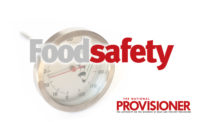Mandating masks in meat plants

Even though I’ve been vaccinated against COVID-19, I still adhere to the rules of whatever store I enter. If they want a mask, I’m not going to make a scene, scream about my rights or babble on about microchips, Bill Gates or lizard people. I’ll just wear the mask. That’s the choice the business has made, and I can respect it. If the business doesn’t require the mask, I’ll probably wear one anyway, because I have a child at home too young to be vaccinated, and even the remote risk that I can bring COVID-19 into my house is one I’m not willing to make. That’s my choice.
So I can respect and understand the decision that FSIS has made to try and keep its inspectors safe – to a point. This week, the Food Safety and Inspection Service has mandated that all federally inspected establishments must require their employees or contractors to wear masks when IPP (inspection program personnel) are present, if the establishment is located in a county with “substantial” or “high” community transmission of COVID-19. Looking at the latest graphs from the CDC COVID data tracker, that would include pretty much every county in the United States except for a few places in the Midwest. Congratulations, Nebraska, you seem to be the only state in the Union that’s doing a good job.
What happens if you don’t require masks? “As of Wednesday, August 25, 2021, FSIS will not provide inspection service to the establishment unless it meets this requirement,” the directive states. Essentially, comply or close down. Or, drop federal inspection temporarily until a more reasonable directive comes down the pike.
Again, I understand that FSIS wants to keep their people safe. The CDC has based their recommendations that everyone should be masked indoors, regardless of vaccination status, on the latest scientific data, and FSIS is attempting to comply. However, the decision has alarmed many meat establishments, plenty of whom are already running short-staffed. A small company can’t afford to have two or three people walk off the job if they refuse to wear a mask while inspectors are present. And a large plant can’t decide to become custom exempt overnight if there are nationwide deliveries to be met.
At the moment, there are few options available. Businesses can have their maskless employees leave workstations when inspectors approach, but that could require a lot of planning, coordination and increased downtime. It’s also not feasible for slaughter operations, where inspectors have to be present. The American Association of Meat Processors has stated its opposition to the mandate and suggests that its members contact their representatives in Washington D.C. Hopefully, there will be a reasonable alternative that keeps everybody safe without impacting the abilities of meat processors to do their jobs.
Sam Gazdziak
gazdziaks@bnpmedia.com
Looking for a reprint of this article?
From high-res PDFs to custom plaques, order your copy today!






